How do you know that your persistent joint pain is a sign of chronic corona?
Joint pain is one of the signs of long-term infection with the coronavirus, as its symptoms persist for months after recovering from the virus, people with long-term coronavirus often visit a doctor because of shoulder, neck, back and knee problems. Complaint, in this report we learn how to know that your persistent joint pain is a sign of chronic corona? According to the Times of India website.
Bone, joint and muscle pain are a common symptom of the coronavirus, and some people may recover within days of infection, while others may take months to adjust even after recovering from the initial infection.
Health problems can make it difficult for them to stay active, exacerbate pain, stiff joints, and cause muscle weakness. Even basic activities such as standing, climbing, grabbing or moving the head can become difficult.
Symptoms of joint pain caused by corona
Some people with joint pain related to the coronavirus have revealed that their pain comes and goes, and even lasts for a period of time before the condition improves permanently.
For others, the pain is accompanied by strange or changing sensations, such as numbness or tingling in the arms or legs. Among them, experts noted that shoulder and arm pain bothers people more than they bother them after contracting the Corona virus, especially those who are hospitalized.
Other common signs of persistent coronavirus
Joint pain is a symptom of long-term coronavirus disease. The list of symptoms people experience after an initial infection is long. Here are some common signs of prolonged coronavirus disease:
-fever
Fatigue and tiredness
- Shortness of breath
- Cough
Source
brain fog
sleep problems
muscle pain
- heart beat
Loss of sense of smell or taste
depression or anxiety
-Dizziness
what should you do
If your muscle pain does not improve or is affecting you more than ever, talk to your doctor. They may prescribe medication and ask you to do some light exercises to reduce joint and muscle stiffness.
Don't sit still, even if it hurts, it will only make it worse. Plan your day carefully and engage in some moderate activity.
You can engage in family activities like gardening, cooking or a flick, and even low-intensity exercises like yoga and stretching can help with joint pain.
Avoid high-intensity activities, such as weightlifting or running, as they may put undue stress on your joints, exacerbating the pain
Don't stay in the same position for too long. Keep changing positions to avoid muscle stiffness.

